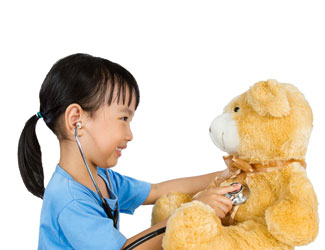Intestinal Rehabilitation Evaluation
The evaluation begins when we consult with your child’s referring doctor and review the data they have collected on your child’s condition. We will also request and review notes from any gastrointestinal (GI) surgeries your child may have had.
Your child will undergo an extensive evaluation and nutritional analysis with all members of our intestinal rehabilitation team to determine what type of intestinal rehabilitation method is best for them. The evaluation may take several days or appointments, depending on what tests and screenings are needed. It may include blood tests, X-rays or other imaging studies, and diagnostic procedures. After we have completed this testing, the intestinal rehabilitation team will tailor our recommendations to your child’s individual needs.
The goals of intestinal rehabilitation for your child include increasing weight gain and linear growth, decreasing stool output, improving hydration, and improving nutrient deficiencies. This may allow your child to be weaned off total parenteral nutrition (TPN).
Your Child's Intestinal Rehabilitation Team
A Team of Experts
The intestinal rehabilitation team at Duke includes gastroenterologists, surgeons, nurse coordinators, registered dietitians, nurse practitioners, social workers, and pharmacists. Your child may also receive care from experts in occupational therapy, speech therapy, and child psychiatry.
Treatment from Birth to Adulthood
We treat infants to to children 18 years of age, and can assist with the transition to adult care.
Convenient Care
Although many of our patients live in the Carolinas, we provide services to children from across the U.S. No matter where you live, we help you schedule your child's appointments to be as convenient as possible. If you live in or near Durham, it may work best to schedule your child's treatment over time. If you live far away, we'll try to condense your child's appointments into the shortest number of days their treatment will allow.
Access to the Latest Research and Treatments
Our role in intestinal rehabilitation research and education means your child benefits from the latest advances in treatment. For example, they may be eligible to participate in pediatric trials for medications that are used to improve intestinal absorption.
Leaders in National Intestinal Rehabilitation and Transplant Organizations
Our intestinal rehabilitation experts hold leadership positions in national intestinal rehabilitation and transplant organizations, including the United Network for Organ Sharing (UNOS).

